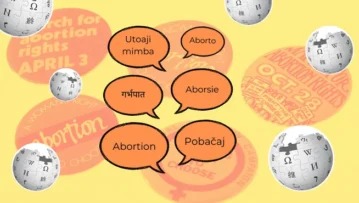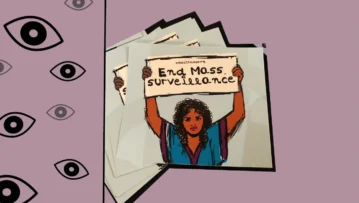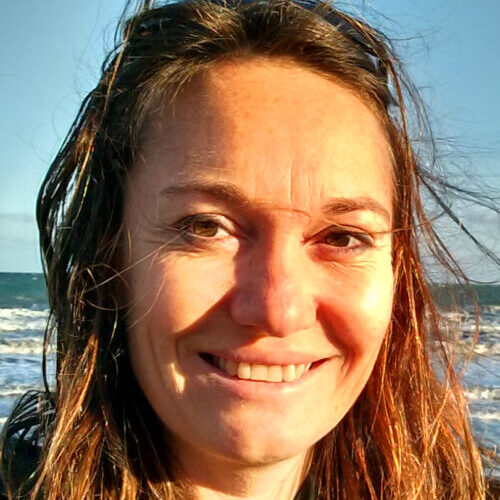في الخامس عشر من مارس، استيقظت في كاليفورنيا لأجد موجة من الرسائل الغاضبة من أصدقائي، والمنشورات على مواقع التواصل الاجتماعي، والمقالات الصحفية حول اغتيال السياسية البرازيلية الشابة والناشطة الحقوقية الجريئة مارييل فرانكو في 14 مارس. لم يتسن لي أن أتعرف على مارييل شخصيًا، ربما لأنني أعيش في الخارج منذ 8 سنوات. إلا أن معلوماتي القليلة عنها قد كانت كافية لتؤكد لي أنها كانت شخصية فريدة ومميزة.
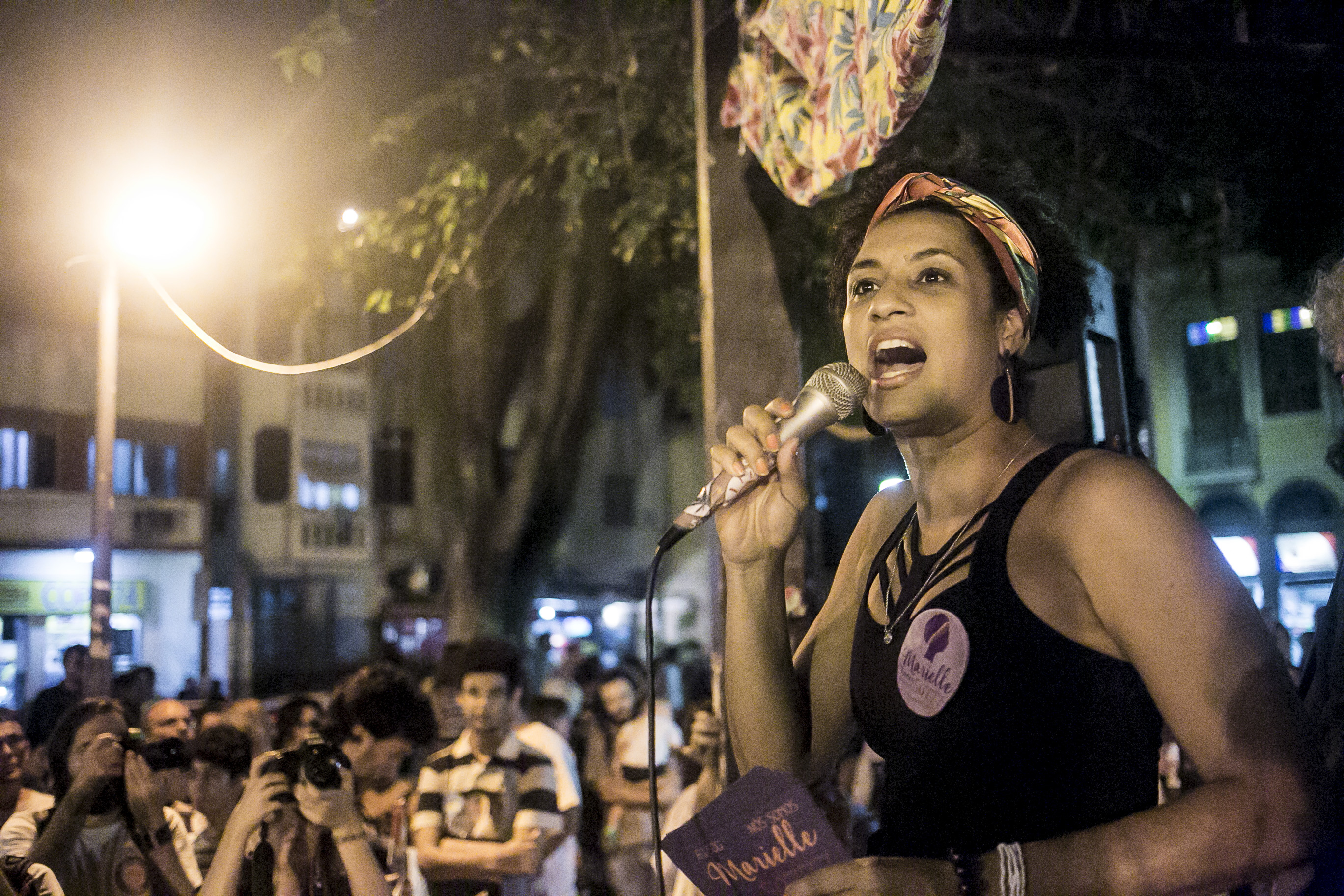
صورة لمارييل فرانكو من مقالتها على ويكيبيديا. تصوير ميديا نينجا، رخصة المشاع الإبداعي نَسب المُصنَّف – الترخيص بالمثل 2.0 عام (CC BY-SA 2.0) ، من خلال ويكيميديا كومنز
مثلت مارييل، التي ولدت في أحد الأحياء العشوائية (فافيلا) بمدينة ريو دي جانيرو، حالة استثنائية للعديد من الإحصاءات حول النساء البرازيليات من ذوات البشرة السوداء. وتعد النساء من ذوات البشرة السوداء هن الأكثر تأثرًا بمشكلة البطالة في البرازيل، كما أن دخولهن قليلة جدًا مقارنةً بالمجموعات الديموغرافية الأخرى – في عام 2007، كانت النساء من ذوات البشرة السوداء تكسبن حوالي نصف ما تكسبه نظيراتهن من ذوات البشرة البيضاء، وحوالي ثلث ما يكسبه الرجال من ذوي البشرة البيضاء في البرازيل. حصلت مارييل على درجة الماجستير في الإدارة العامة، وأصبحت تعرف بنقدها اللاذع للعنف الذي ترتكبه قوات الشرطة في أحياء الفافيلا، كما كانت من أكثر السياسيين انتخابًا في مدينتها. إن الإنجازات التي حققتها مارييل قد جعلت منها حالة استثنائية في دولة نصف سكانها هم من أصحاب البشرة السوداء والسمراء، ومع ذلك يحصل 12% منهم فقط على تعليم عالي.
من جهة أخرى، فإن اغتيال مارييل في 14 مارس يضاف إلى ظاهرة أخرى مقلقة تنتشر في البرازيل. فمع الانخفاض الملحوظ في جرائم قتل النساء ذوات البشرة البيضاء، شهدت جرائم قتل النساء من ذوات البشرة السوداء ارتفاعًا بنسبة 50%. باعتباري امرأة برازيلية سوداء، أعلم جيدًا أن انتشار خبر مقتل امرأة سوداء أخرى من دول الجنوب بشكل مأساوي ليصل إلى أهم الأنباء على المستوى الوطني والعالمي، ليس أمرًأ يحدث كل يوم. لذلك شعرت بالصدمة والحزن، وكنت مهتمة بأن أعرف المزيد عن مارييل وحياتها.
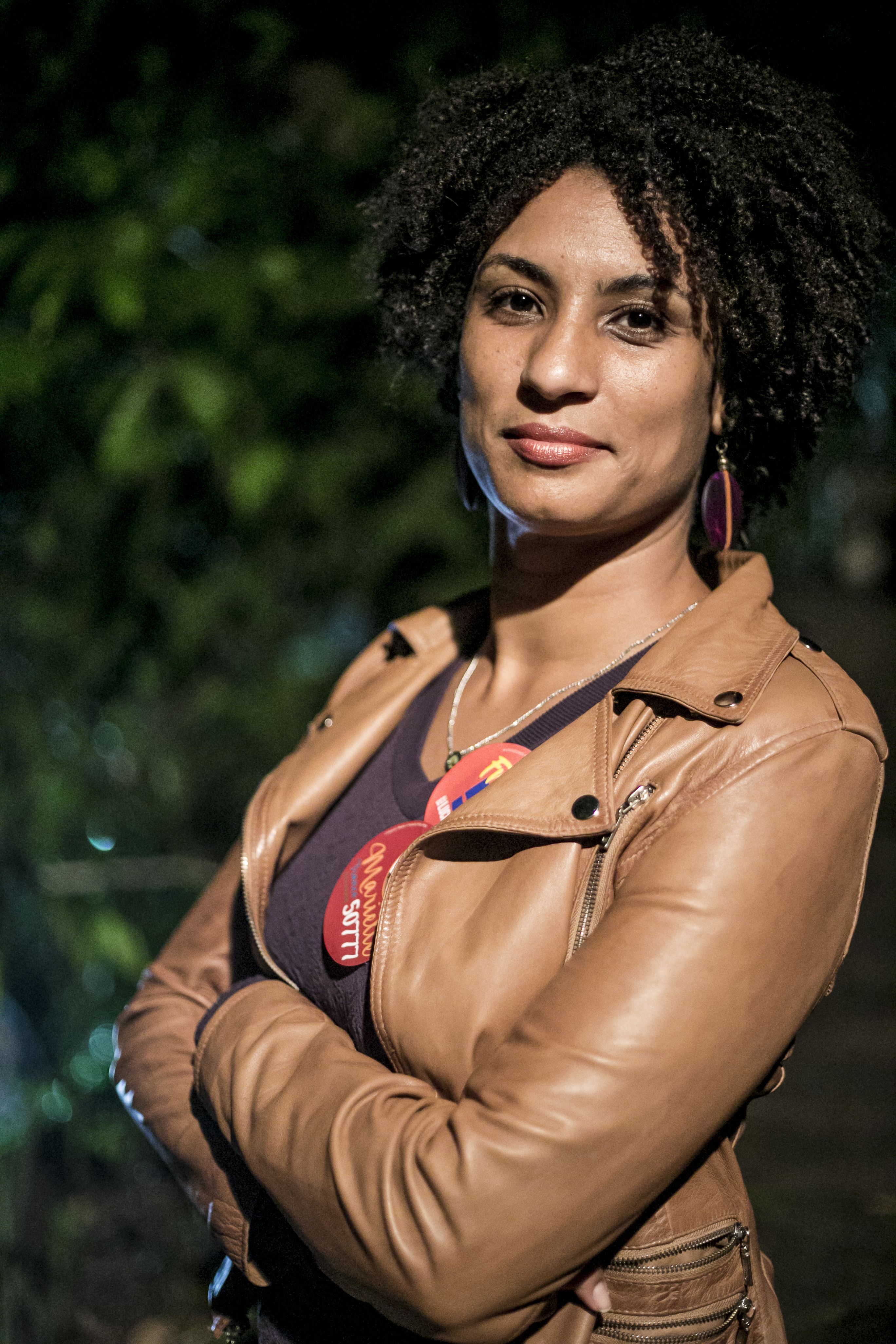
مارييل فرانكو في حديث لها عام 2016. تصوير ميديا نينجا، رخصة المشاع الإبداعي نَسب المُصنَّف – الترخيص بالمثل 2.0 عام (CC BY-SA 2.0) ، من خلال ويكيميديا كومنز
بالطبع، فقد كان أول مكان أبدأ به هو ويكيبيديا البرتغالية. قمت بالبحث عن اسمها وظهرت مقالتها أمامي على الفور (توجد نسخة إنجليزية أيضًا). ها هي! تفاجأت من الجودة العالية التي كانت عليها المقالة، وزادت دهشتي لاحتوائها على صورة جميلة تحت ترخيص حر – عادةً لا يكون ذلك هو الحال بالنسبة للنساء من ذوات البشرة السوداء، خاصة من دول الجنوب، واللاتي غالبًأ ما يتم إغفالهن على ويكيبيديا. رغم السبب البشع الذي قادني إلى مقالة مارييل ماركو هذا الصباح، فقد كان لدي إحساس بأن الأمور باتت تتغير نحو الأفضل على ويكيبيديا وفي العالم. سعدت لرؤية أن حياة وإنجازات هذه المرأة السوداء التي تنتمي إلى الأقلية، والأم، والسياسية الشابة، والمدافعة عن حقوق الإنسان، والتي تشبهني تمامًأ، هي بالفعل موجودة، وممثَلة، ومعترف بها على ويكيبيديا.
ما لم أكن أعرفه هو أن مقالة مارييل على ويكيبيديا لم تكن موجودة حتى اليوم السابق. رغم أن هناك من حاول إنشاء مقالة عن مارييل عام 2017، فقد قام محررو ويكيبيديا البرتغالية بحذف المقالة. في يونيو 2017، في نقاش الحذف، كان المحرر جالوب هو الوحيد المؤيد لإبقاء مقالة مارييل على الموقع، لكن صوته لم يكن كاقيًا. قررت مجموعة من ستة محررين على ويكيبيديا البرتغالية أن مارييل لا تستحق أن يكون لها مقالة على الموقع، لأنها لا تستوفي شرط “الملحوظية” – وهي إحدى السياسات التي تساعد المتطوعين على تحديد من يجب أن يكون موجودًا على ويكيبيديا. صوَّت هؤلاء المحررون على حذف المقالة وإخفاء حياة مارييل وذكراها من الموقع رقم 12 من حيث نسبة الزيارة في البرازيل، والذي يعد أيضًا أحد المواقع العشرة الأكثر زيارة على مستوى العالم. من وجهة نظرهم، إن حياة مارييل، وعملها، وكل ما جعلها استثنائية كسياسية، وناشطة، ومدافعة عن حقوق الإنسان، ورمز حي للأمل للملايين من سكان ريو دي جانيرو، جميعها أمور ليست بالأهمية الكافية التي تبرر وجود صفحة لها على ويكيبيديا. لم ينجح Joalpe في الدفاع عن قضية إعادة إنشاء المقالة على ويكيبيديا سوى يوم مقتل مارييل في 14 مارس. وفي 15 مارس، استطعت أن أقرأ عن حياة هذه المرأة المميزة، وعن مقتلها.
ويصف جالوب، وهو محرر ويكيبيديا الذي كافح لإبقاء مقال مارييل على الموقع حتى قبل اغتيالها بصورة وحشية، المسار المحبط والحزين للمقالة، قائلاً: ” لقد تم إعدام مارييل ماركو على ويكيبيديا قبل أن تعدم في الشارع. أنا أؤمن جدًأ بأن هذين الأمرين مترابطان. ”
قد تبدو هذه القصة مألوفة جدًا للعديد من بيننا الذين يقومون بإضافة محتوى عن المجتمعات المهمشة على ويكيبيديا. يعد الدفاع عن ملحوظية النساء في نقاشات الحذف هو تقليد سنوي تتبعه العديد من الجهات المنظمة لفعاليات شهر مارس في جميع أنحاء العالم بهدف كتابة المزيد عن المرأة على ويكيبيديا. على سبيل المثال، عقب ورشة التحرير الجماعي التي عقدتها منظمة الفن+النسوية في أوروجواي الأسبوع الماضي، تم ترشيح ثمانية مقالات عن نساء أمريكا اللاتينية للحذف من ويكيبيديا الإسبانية، من بينهن الكاتبة العالمية إيدا فابري الحائزة على عدة جوائز، والشاعرة أليسيا بورو، والصحفية والناشطة الرائدة دولوريس كاستيلو.
إن الهدف الأصلي الذي وضعت من أجله معايير الملحوظية الخاصة بويكيبيديا هو منعك من استخدام الموقع للترويج لفرقتك الموسيقية الناشئة، أو المشروع المنزلي الصغير الذي أقامه جدك. ووجود بعض المعايير حول المحتوى الذي يجب أن تتضمنه أية موسوعة هو أمر معقول تمامًا من الناحية النظرية على الأقل. ولكن فعليًا، تتطلب إرشادات الملحوظية الخاصة بويكيبيديا ”وجود تغطية مهمة بواسطة مصادر موثوقة ومستقلة عن الموضوع“، وهناك الكثير من الأحكام التي تساهم في تحديد المصادر المهمة، والموثوقة، والمستقلة. ولأن النساء من دول الجنوب عادةً ما يتم إغفالهن في كتب التاريخ، والمجلات الأكاديمية، والمصادر الإخبارية السائدة، فإن النساء من أمثال مارييل من المرجح أن يُنظر إليهن بعلى أنهن غير بارزات مقارنة بأي سياسي أمريكي أبيض.
وذلك حتى موتهن. وأحيانًا ما تنشَأ مصادر جديدة بعد وفاة إحدى الشخصيات فتجعل منها شخصيةً بارزة (مثل مارييل)…ولكن ليس ذلك هو الحال دائمًا. عندما قتلت دلتا مغول، وهي امرأة هندية من جماعة “داليت”، قرر محررو ويكيبيديا الإنجليزية أن يشيروا إليها على موقع ويكيبيديا، ولكن ليس بإنشاء مقالة عن شخصها. بل إنكم سوف تتعرفون على دلتا فقط من خلال المقالة التي تحمل عنوان ”قضية اغتصاب دلتا مغول“. بمعنى آخر، بالنسبة للعديد من النساء من ذوات البشرة السوداء أو السمراء واللاتي تنتمين إلى دول الجنوب، فإن الاغتصاب أو القتل هو ما يجعلنا بارزات، وليس حياتنا أو أعمالنا الرائدة.
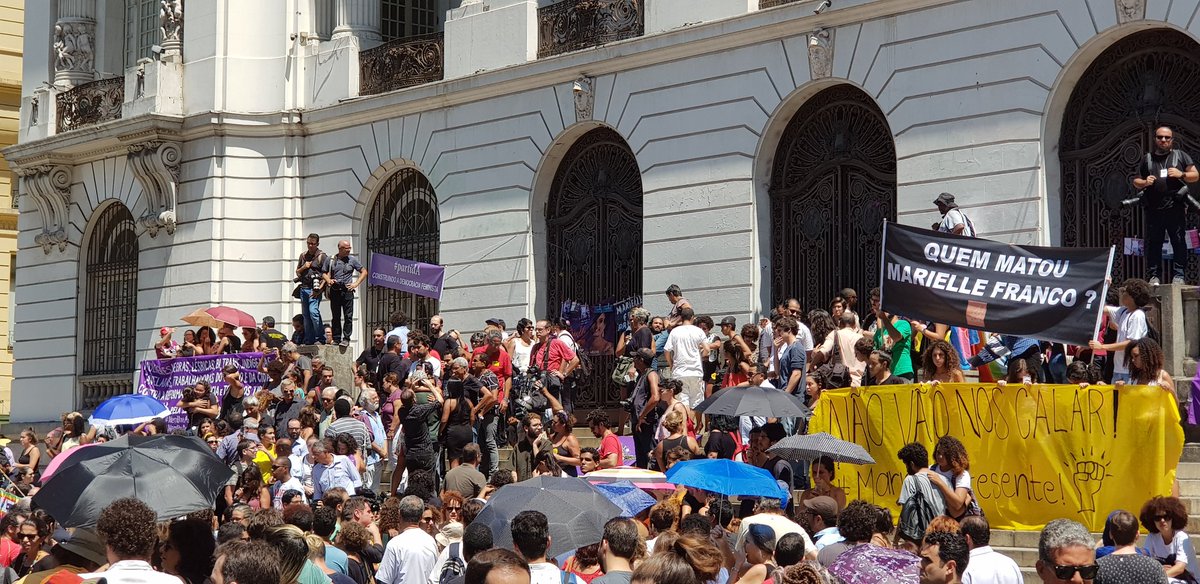
مظاهرة في ريو دي جانيرو أثناء نقل جثمان مارييل فرانكو. تصوير سيلسو روشا دي باروس، رخصة المشاع الإبداعي نَسب المُصنَّف – الترخيص بالمثل 4.0 عام (CC BY-SA 4.0) ، من خلال ويكيميديا كومنز
وفقًأ لإحدى وكالات الأنباء المحلية، فقد بلغ عدد الزيارات التي حظيت بها مقالة مارييل باللغة البرتغالية حوالي 000 70 زيارة في اليوم السابق لاغتيالها. وقد كنت أنا من بين الديد من الأشخاص الذين اختاروا أن يثقوا في ويكيبيديا لتخبرهم المزيد حول هذه المرأة الخارقة، التي تحدت كل الصعاب التي تواجهها النساء البرازيليات من ذوات البشرة السوداء خلال حياتهن، فيما يتعلق بالحقوق والفرص.
مع ذلك، فإن مارييل، رغم إنجازاتها المتعددة ومسارها الفريد، لم تعتبر بارزة بما يكفي لإظهارها على ويكيبيديا حتى اليوم الذي اغتيلت فيه بشكل وحشي. عندما صدرت العديد من التقارير الإخبارية حول مقتل مارييل وأحاطته ضجة كبيرة، حينها فقط تم إنشاء مقالة مارييل في 16 نسخة من ويكيبيديا باللغات المختلفة.
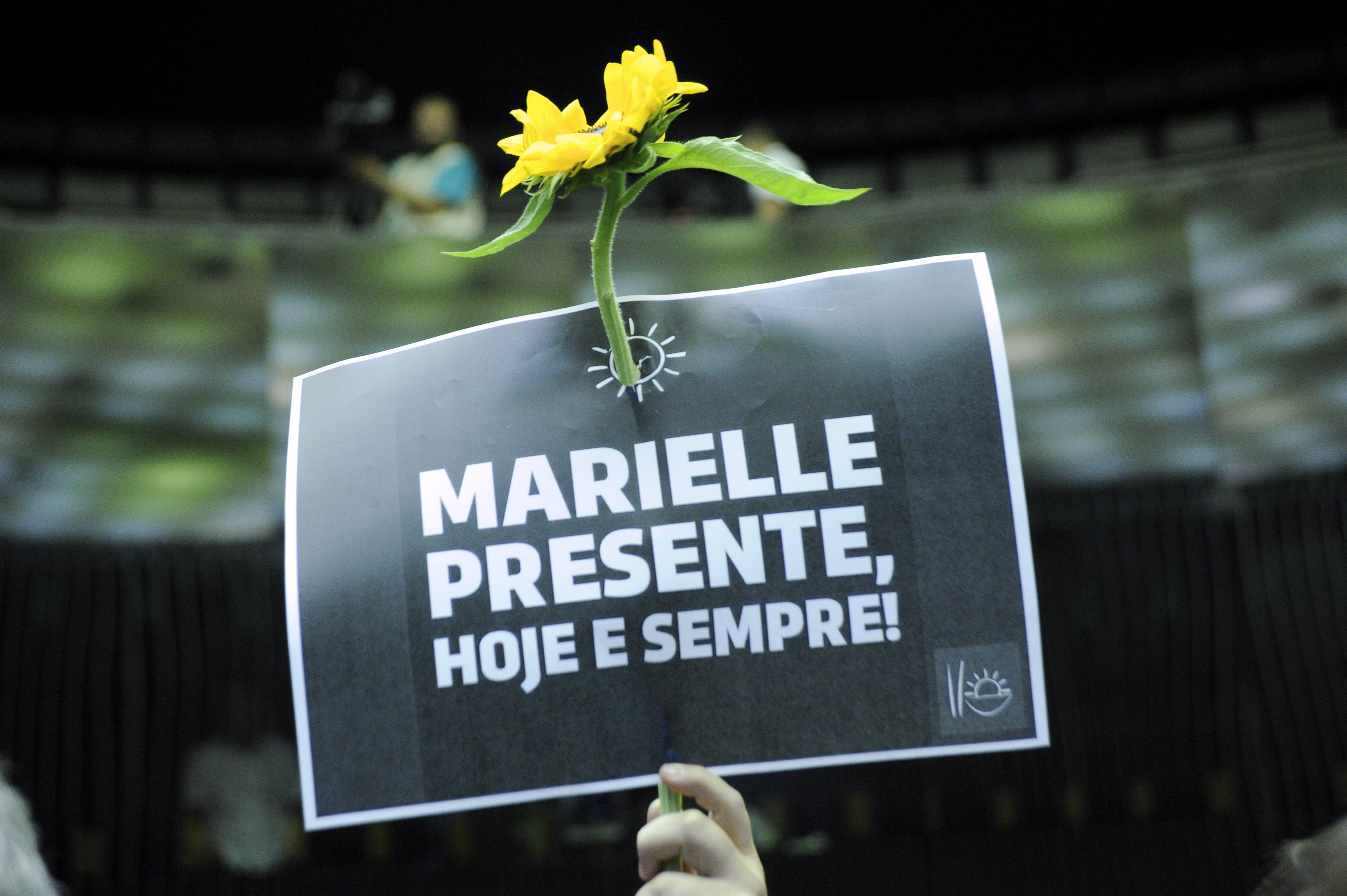
لافتة احتجاجية تحمل شعار “مارييل، حاضرة.” تصوير سيمادو فيدرال، رخصة المشاع الإبداعي نَسب المُصنَّف – الترخيص بالمثل 2.0 عام (CC BY-SA 2.0) ، من خلال ويكيميديا كومنز
إن العالم مليء بالنساء الرائعات اللاتي تكتسب حياتهن وإنجازاتهن أهمية ومغزى كبيرين، قصصهن تستحق أن تُحكى. أنا أحتاج وأستحق أن أرى أخريات مثلي على أكبر موسوعة إلكترونية في العالم. ولتتم إضافتنا بينما نحن على قيد الحياة، لا بعد أن يحدث لنا أمر مروع فقط.
بينما ننظم تحدي#VisibleWikiWomen خلال مارس الجاري، تمثل قصة مارييل تذكِرة أليمة بأنه لا تزال هناك حاجة ملحة إلى المبادرات مثل VisibleWikiWomen#، والعمل الذي تقوم به منظمة Whose Knowledge?، والجهود التي يقودها عدد كبير من المجتمعات والشركاء حول العالم. إن مقالة مارييل كانت يجب أن تكون بمثابة تكريم لها على مشوارها الاستثنائي بينما هي على قيد الحياة. ولكنها الآن تعد تكريمًا لها بعد وفاتها على كل ما قدمته وما كانت تمثله. عسى أن يظل نضالها مصدر إلهام لنا في كفاحنا لحشد أصوات، ومعارف، وسير النساء المهمشات على الإنترنت وخارجها.
كتبت: Adele Vrana


